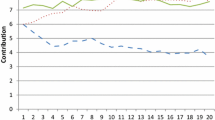Abstract
Formulating a dynamic game model of a world exhaustible resource market, in this paper, we study welfare implications of Stackelberg leaderships for an individual country and the world. We overcome the problem of time-inconsistency by imposing a “credibility condition” on the Markovian strategy of the Stackelberg leader. Under this condition, we show that the presence of a global Stackelberg leader leaves the follower worse off relative to the Nash equilibrium. Moreover, the world welfare is highest in the Nash equilibrium as compared with the two Stackelberg equilibria.
Similar content being viewed by others
References
Basar T, Olsder GJ (1982) Dynamic noncooperative game theory. Academic Press, London
Benchekroun H, Long NV (1998) Efficiency inducing taxation for polluting oligopolists. J Public Econ 70:325–342
Benchekroun H, Long NV, Tian H (1999) Learning-by-doing and strategic trade policy. Rev Int Econ 7:493–508
Bergstrom TC (1982) On capturing oil rents with a national excise tax. Am Econ Rev 72:194–201
Blanchard OJ, Gali J (2010) The macroeconomic effects of oil price shocks: why are the 2000s so different from the 1970s. In: Gali J, Gertler M (eds) International dimensions of monetary policy. University of Chicago Press, Chicago, pp 373–428
Brander J, Djajic S (1983) Rent extracting tariffs and the management of exhaustible resources. Can J Econ 16:288–298
Chou S, Long NV (2009) Optimal tariffs on exhaustible resources in the presence of cartel behavior. Asia-Pac J Account Econ 16:239–254
Dockner E, Jorgensen S, Long NV, Sorger G (2000) Differential games in economics and management Science. Cambridge University Press, Cambridge
Karp L (1984) Optimality and consistency in a differential game with non-renewable resources. J Econ Dyn Control 8:73–97
Karp L, Newbery DM (1991) OPEC and the US oil import tariff. Econ J 101:303–313
Karp L, Newbery DM (1991) Optimal tariffs on exhaustible resources. J Int Econ 30:285–299
Karp L, Newbery DM (1992) Dynamically consistent oil import tariffs. Can J Econ 25:1–21
Kemp MC, Long NV (1979) The interaction between resource-poor and resource-rich economies. Aust Econ Pap 18:258–267
Kemp MC, Long NV (1980) Optimal tariffs on exhaustible resources. In: Kemp MC, Long NV (eds) Exhaustible resources, optimality, and trade. North Holland, Amsterdam, pp 183–186
Kemp MC, Long NV, Shimomura K (1993) Cyclical and noncyclical redistributive taxation. Int Econ Rev 34:415–429
Kohl WL (2002) OPEC behavior, 1998–2001. Q Rev Econ Finance 42:209–233
Liski M, Tahvonen O (2004) Can carbon tax eat OPEC’s rents? J Environ Econ Manag 47:1–12
Long NV (2010) A survey of dynamic games in economics. World Scientific, Singapore
Long NV, Shimomura K (2002) Redistributive taxation in closed and open economies. In: Woodland A (ed) Economic theory and international trade: essays in honour of Murray C. Kemp. Springer, Berlin, pp 104–123
Long NV, Sorger G (2010) A dynamic principal-agent problem as a feedback Stackelberg differential game. Cent Eur J Oper Res 18:491–509
Maskin E, Newbery D (1990) Disadvantageous oil tariffs and dynamic consistency. Am Econ Rev 80:143–156
Mehlmann A (1988) Applied differential games. Kluwer Academic, New York
Reinganum JF, Stokey NL (1985) Oligopoly extraction of a common property natural resource: the importance of the period of commitment in dynamic games. Int Econ Rev 26:161–173
Rubio S (2005) Tariff agreements and non-renewable resource international monopolies: prices versus quantity. Working Paper WP-AD-2005-10, University of Valencia
Rubio S, Escriche L (2001) Strategic Pigouvian taxation, stock externalities and polluting non-renewable resources. J Public Econ 79:297–313
Salo S, Tahvonen O (2001) Oligopoly equilibria in non-renewable resource markets. J Econ Dyn Control 25:671–702
Smith JL (2009) World oil: market or mayhem? J Econ Perspect 23:145–164
Tahvonen O (1996) Trade with polluting non-renewable resources. J Environ Econ Manag 30:1–17
Wirl F (1995) The exploitation of fossil fuels under the threat of global warming and carbon taxes: a dynamic game approach. Environ Resour Econ 5:333–352
Wirl F, Dockner E (1995) Leviathan governments and carbon taxes: costs and potential benefits. Eur Econ Rev 39:1215–1236
World Trade Organization (2010) World Trade Report 2010
Author information
Authors and Affiliations
Corresponding author
Rights and permissions
About this article
Cite this article
Fujiwara, K., Long, N.V. Welfare Implications of Leadership in a Resource Market under Bilateral Monopoly. Dyn Games Appl 1, 479–497 (2011). https://doi.org/10.1007/s13235-011-0036-1
Published:
Issue Date:
DOI: https://doi.org/10.1007/s13235-011-0036-1



